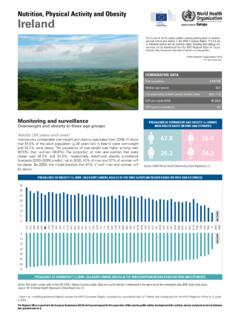Transcription of Mental Health Promotion in Young People – an …
1 Mental Health Promotion in Young People an Investment for the Future By: Eija Steng rd and Kaija Appelqvist-Schmidlechner Keywords Mental Health . Health Promotion . CHILD WELFARE. ADOLESCENT. EUROPE. Address requests about publications of the WHO Regional Office for Europe to: Publications WHO Regional Office for Europe Scherfigsvej 8. DK-2100 Copenhagen , Denmark Alternatively, complete an online request form for documentation, Health information, or for permission to quote or translate, on the Regional Office web site ( ). World Health Organization 2010. All rights reserved. The Regional Office for Europe of the World Health Organization welcomes requests for permission to reproduce or translate its publications, in part or in full. The designations employed and the presentation of the material in this publication do not imply the expression of any opinion whatsoever on the part of the World Health Organization concerning the legal status of any country, territory, city or area or of its authorities, or concerning the delimitation of its frontiers or boundaries.
2 Dotted lines on maps represent approximate border lines for which there may not yet be full agreement. The mention of specific companies or of certain manufacturers' products does not imply that they are endorsed or recommended by the World Health Organization in preference to others of a similar nature that are not mentioned. Errors and omissions excepted, the names of proprietary products are distinguished by initial capital letters. All reasonable precautions have been taken by the World Health Organization to verify the information contained in this publication. However, the published material is being distributed without warranty of any kind, either express or implied. The responsibility for the interpretation and use of the material lies with the reader. In no event shall the World Health Organization be liable for damages arising from its use. The views expressed by authors, editors, or expert groups do not necessarily represent the decisions or the stated policy of the World Health Organization.
3 Mental Health Promotion in Young People an Investment for the Future page 1. The foundation for good Mental Health is laid in the early years of childhood and adolescence. Growing evidence shows the long-term value of promoting the positive Mental Health of children and Young People . Nevertheless, the focus of social and Health care providers generally lies on Mental Health problems and illness and their treatment. There is an urgent need to develop more comprehensive support services and interventions for Young People . Young People 's Mental Health as a key area of concern in Europe The Health and Mental well-being of children and adolescents in general is good in Europe. Most are satisfied with their lives, perceive their Health to be good and do not regularly suffer from Health complaints (Morgan 2008). The main problems of the first half of the 20th century, such as acute infections and high infant mortality, have diminished in importance (Palfrey et al.)
4 2005). Instead of physical disorders, Mental illness accounts for a large and growing share of ill Health among children and adolescents in Europe. The so-called new-morbidity including emotional problems, conduct problems and learning disabilities came to the fore in the middle of the last century. Currently within the frame of the so-called millennial morbidity (Palfrey et al. 2005), Mental Health and socioeconomic influences on Health have risen to achieve importance within child and adolescent Health (Ravens-Sieberer et al. 2007). WHO declared that Young People 's Mental Health is a key area of concern to which professionals and policy-makers must direct their attention (WHO 2005). Adolescence as a critical period in the lifespan The situation of Young People is rapidly changing across the globe. The group of Young People is less homogenous than the group of school aged children, and the life trajectory for Young adults is not as predictable or as homogeneous as in previous generations (Rowling 2006).
5 Transition into adulthood is a period which is determined by many changes. Adolescents and Young adults are in a key phase of establishing independent identity, making educational and vocational decisions and lifestyle choices as well as forming interpersonal relationships. All of these have major long-term influences on the individual, particularly in terms of factors that influence Mental Health and well-being. Young People are particularly vulnerable to social exclusion, notably in the transition stage between education and employment. For example leaving school early without access to full time work can lead to disconnection economically and socially and failure to develop a sense of the future. These Young People form a specific category of invisible Young People , as their possibilities and rights to a minimum income or Health insurance are in many countries only minor (Policy paper on the Health and well being of Young People 2008).
6 Compared to adults, Young People are especially at risk of creating vulnerabilities or developing Mental Health disorders as they face many new pressures and challenges in their daily lives. Leaving the parental home for the first time, financial worries, limited employment or educational opportunities or worries with human relations can cause high levels of stress, which can trigger Mental disorders. Several disorders, such as depression, schizophrenia and substance abuse are identified as having their onset at this age (WHO 2001). Mental Health Promotion in Young People an Investment for the Future page 2. Mental Health problems of Young People affect whole society In spite of the fact that most children and adolescents perceive their Health to be good, there is a sizeable minority of Young People reporting their Health to be either fair or poor and experiencing a number of recurring Health complaints (Morgan et al.)
7 2008). Worldwide, up to 20% of children and adolescents suffer from disabling Mental Health problems (WHO 2001). As Mental Health problems in adolescence tend to be under-recognized and undertreated (Sourander et al. 2004), estimates of psychological problems and disorders may therefore be higher than is reported in studies. On an individual level, Mental Health problems can have deteriorating effects on Young People 's social, intellectual and emotional development and consequently on their future. At its worst, they can lead to loss of life. Suicide is one of the three leading causes of death in Young People and a public Health concern in many European countries (WHO 2001). Besides the negative effects on an individual level, Mental illness affects also many other spheres of life family, friends and society at large causing costs not only in Health care system. In fact , the costs of Mental illness among children and adolescents have indicated to fall to a very large extent on sectors outside the Health care system only 6% of costs fall on the Health system (Suhrcke et al.
8 2007). Furthermore, there are close links between child and adult Mental illness . the presence of Mental illness during childhood may lead to up to 10 times higher costs during adulthood (Suhrcke et al. 2007). Positive Mental Health considers Mental Health as a resource Focusing only on Mental Health disorders does not give the whole picture of the state of Mental Health among Young People . A general problem is the predominant understanding of Mental Health as the absence of Mental disorder. Risk factor research has focused on Mental Health problems rather than strengths and positive outcomes. One current theoretical framework is resilience, used as a descriptor for positive Mental Health and well-being. Consideration of resilience has emerged from research indicating that a proportion of Young People have had a positive life trajectory despite having faced diverse potentially harmful life experiences.
9 In addition to resilience, positive Mental Health includes a positive sense of well-being; individual resources, such as self-esteem, optimism and a sense of mastery and coherence; ability to initiate, develop and sustain mutually satisfying personal relationships; and ability to cope with adversities (Lehtinen 2008). Young People are often reluctant to seek professional help for their problems It is estimated that only 10 15% of Young People with Mental Health problems receive help from existing Mental Health services (WHO 2005). Young People often underestimate the need for outside help and attempt to deal with their problems on their own. Therefore, Young People must be empowered through the provision of information on Mental Health problems and opportunities for support and treatment (Rickwood et al. 2005). Particularly Young men with a wide range of psycho-social problems are often beyond reach of Health and social services.
10 Young men are less likely than women to seek professional help for depression, substance abuse, physical disabilities and stressful life events (Rickwood et al. 2005; Sourander et al. 2004; Tylee & Walters 2004;. Biddle et al. 2000). Those who are most in need are often the ones who are most reluctant to seek for help (H sler et al. 2005). Mental Health Promotion in Young People an Investment for the Future page 3. Youth programmes tend to be deficit-oriented, emphasizing youth problems, leading People to focus on what is wrong with youth rather than what is right. From a practitioner's view, this can be problematic because of the potential to stigmatize Young People , undermine their motivation, or discourage them from becoming involved in support programs at all (Small & Memmo 2004). Help needs to be very easy to access for Young People , without fear of stigma. Problems tend to accumulate Very often problems encountered in adolescence are the result of an interaction of several factors and cannot be determined by one single factor alone (Flay 2002).


















